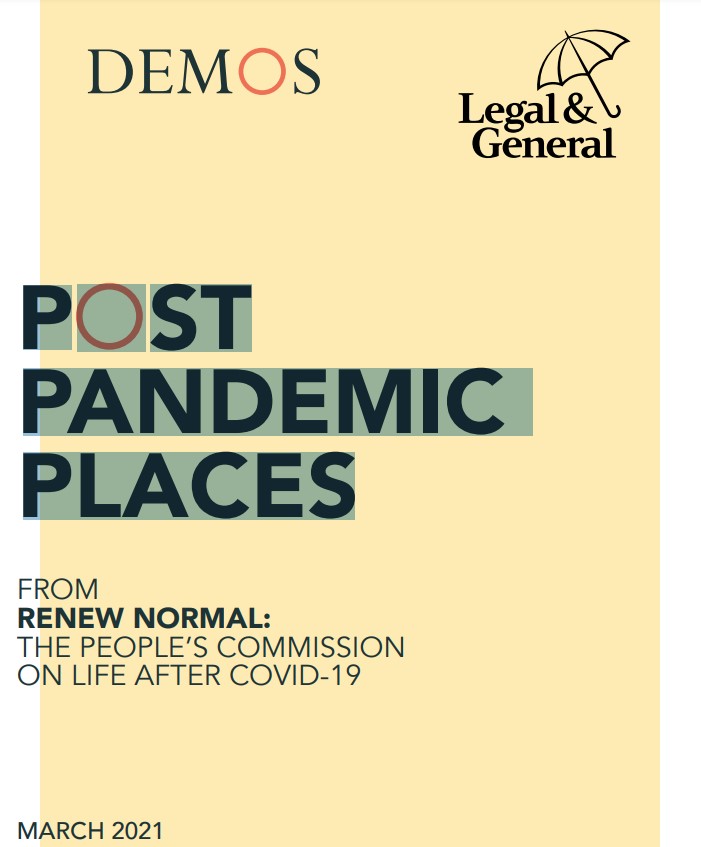Post pandemic places report

|
Contents |
[edit] Introduction
Post Pandemic Places was commissioned by Legal & General and published in March 2021. It reveals that pandemic-based home working, coupled with a desire for continued flexibility, could increase the number of people spending money in their communities and buying local. As a result of these findings, the Government is being encouraged to invest in the establishment of more local offices and hybrid-working initiatives.
[edit] Report findings
Conducted by the think tank Demos, the report found that 65% of the working population were forced to change their place of work during 2020 as a result of the pandemic. Of these, 79% want to continue to have some form of remote working in the future. However, the findings - taken from a large, nationally representative poll of 20,000 adults - indicate that a desire to work remotely is not necessarily the same as wanting to work from home all of the time.
Relatively high levels of support were recorded for ‘local desk space’, particularly among younger people, with one fifth of those in their 20s rating it as their top priority for employment premises in their locality. When asked how people were intending to spend their money once the pandemic restrictions were over, 36% plan to spend more locally than they did before the lockdowns of 2020 and 2021. Amongst those people required to work from home, this percentage rose to 47%.
The report suggests there is an opportunity for the Government and businesses to support more hybrid working and flexible local desk space, to give people the options they prefer and to progress the 'levelling up' agenda. It is also thought the move could help to spread spending power across a wider geographic area.
[edit] Farewell to corporate headquarters?
Historically, investment in landmark regional offices has been shown to drive regeneration and economic growth. This supports job creation, increases in daytime footfall and drives spending towards local high streets.
This has been demonstrated through HMRC’s Government Hubs programme, which has seen the establishment of 11 regional offices across the UK. In Cardiff, for example, the ‘Central Square’ Hub played a role in the city centre’s transformation, supporting an estimated increase in economic wealth of £1.1bn over 10 years.
Based on this model, remote working can help serve as a community regeneration tool. This could be supported by introducing employee tax incentives, such as ‘remote working vouchers’, similar to the childcare voucher scheme.
[edit] Making flex-work permanent
Throughout the pandemic, people changed the location they work, and those people have built a new relationship with their local area that is expected to remain even after pandemic restrictions have been lifted.
The Government has stated that it intends to make all jobs flexible by default. This move could be supported by the conversion of some local civic buildings to remote working spaces, which could be used by any civil servant.
[edit] Related articles on Designing Buildings
- 15 minute city.
- CEOs predict COVID-19 workplace changes will be permanent.
- City centre.
- Commons Committee report on High Street support addresses evidence submitted by IHBC.
- Converting commercial offices to residential accommodation.
- Converting office and retail to residential housing on the high street.
- Creating more socially just and diverse cities.
- Flexible working in engineering services.
- High street.
- Hub and spoke model.
- Meanwhile use of buildings.
- Pandemic migration.
- The compact sustainable city.
- The town's time has come.
- Town planner.
- Workplaces of the future.
[edit] External resources
- Legal & General, Post Pandemic Places.
Featured articles and news
One of the most impressive Victorian architects. Book review.
RTPI leader to become new CIOB Chief Executive Officer
Dr Victoria Hills MRTPI, FICE to take over after Caroline Gumble’s departure.
Social and affordable housing, a long term plan for delivery
The “Delivering a Decade of Renewal for Social and Affordable Housing” strategy sets out future path.
A change to adoptive architecture
Effects of global weather warming on architectural detailing, material choice and human interaction.
The proposed publicly owned and backed subsidiary of Homes England, to facilitate new homes.
How big is the problem and what can we do to mitigate the effects?
Overheating guidance and tools for building designers
A number of cool guides to help with the heat.
The UK's Modern Industrial Strategy: A 10 year plan
Previous consultation criticism, current key elements and general support with some persisting reservations.
Building Safety Regulator reforms
New roles, new staff and a new fast track service pave the way for a single construction regulator.
Architectural Technologist CPDs and Communications
CIAT CPD… and how you can do it!
Cooling centres and cool spaces
Managing extreme heat in cities by directing the public to places for heat stress relief and water sources.
Winter gardens: A brief history and warm variations
Extending the season with glass in different forms and terms.
Restoring Great Yarmouth's Winter Gardens
Transforming one of the least sustainable constructions imaginable.
Construction Skills Mission Board launch sector drive
Newly formed government and industry collaboration set strategy for recruiting an additional 100,000 construction workers a year.
New Architects Code comes into effect in September 2025
ARB Architects Code of Conduct and Practice available with ongoing consultation regarding guidance.
Welsh Skills Body (Medr) launches ambitious plan
The new skills body brings together funding and regulation of tertiary education and research for the devolved nation.
Paul Gandy FCIOB announced as next CIOB President
Former Tilbury Douglas CEO takes helm.






















